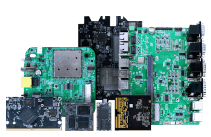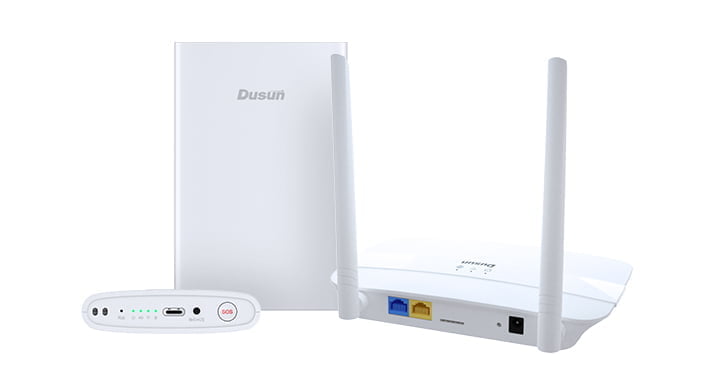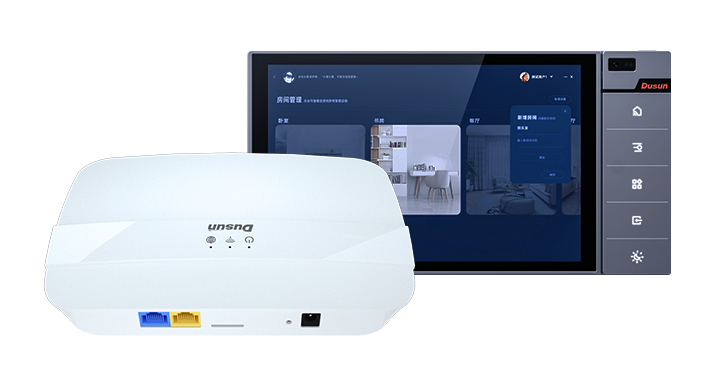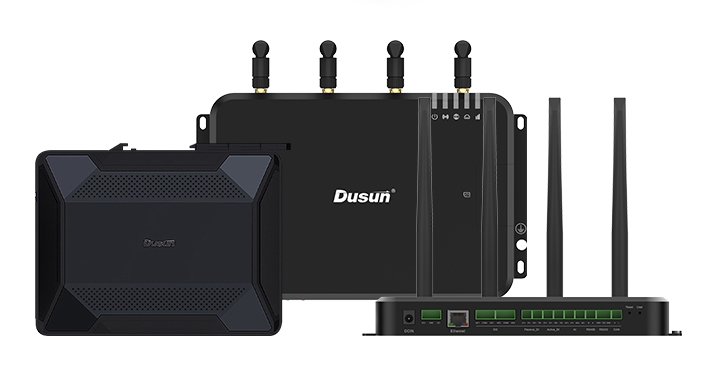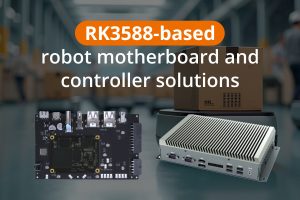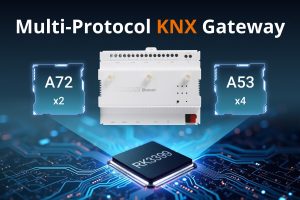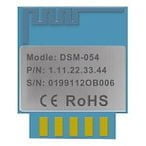
1. DSM-054 BLE Module Overview
DSM-054 BLE module is a low-power embedded module that Dusun IoT has developed. DSM-054 employs Silicon Labs’s EFR32BG21 Series 2 Bluetooth® Wireless SoC, which includes a 80 MHz ARM Cortex-M33 core to provide plenty of processing capability and an integrated security subsystem provides leading security features that greatly reduce the risk of IoT security breaches and compromised intellectual property.
DSM-054 Bluetooth Low Energy module includes Secure Vault, 1024 kB of flash, 96 kB of RAM. With up to 20 dBm maximum power output and an excellent receive sensitivity of -97 (1 Mbit/s GFSK) dBm. It provides a robust RF link for reliable communications for Bluetooth 5.1 and Bluetooth mesh applications.
2. Features of DSM-054 BLE Bluetooth Module
- ARM® Cortex®-M33(Floating-Point Unit)
- Up to 80 MHz Clock Speed
- Low Active Mode Current: 50.9 µA/MHz
- Up to 1024 kB of Programmable Flash
- Up to 96 kB SRAM
- BLE RF features
Compatible with Bluetooth 5, Bluetooth 5.1 and Bluetooth mesh specification
Excellent receive sensitivity:
-104.9 dBm @125 kbps GFSK
-97.5 dBm @1 Mbps GFSK
-94.4 dBm @2 Mbps GFSK
Programmable output power: Up to +20 dBm
Active mode RX: 8.8 mA
Active mode TX: 9.3 mA @ 0 dBm
Active mode TX: 33.8 mA @ 10 dBm - Working temperature: -20℃ to +85℃
- Humidy:<85%RH
3. Applications of DSM-054 EFR32BG21B Bluetooth LE Module
- Universal Smart Hub
- Smart household and home appliances
- Smart socket and light
- Industrial Bluetooth Gateway
- Baby monitor
- Network camera
- Intelligent bus
4. DSM-054 Bluetooth Low Energy Module Interfaces
DSM-054 dimensions are 15 (±0.35) mm (W)×18 (±0.35) mm (L) ×2.8(±0.15) mm(H):


The definition of interface pins is shown in the following table:
| Pin No. | Symbol | I/O type | Function |
|---|---|---|---|
| 1 | VCC | P | Power supply reference ground pin |
| 2 | PA04 | I/O | GPIO interface |
| 3 | GND | I/O | Power supply reference ground pin, which must be properly grounded |
| 4 | PA03 | I/O | GPIO interface |
| 5 | Rx | I/O | Serial interface receiving pin |
| 6 | PA00 | I/O | GPIO interface |
| 7 | Tx | I/O | Serial interface transmission pin |
| 8 | ADC | P | ADC input |
| 9 | PB00 | GPIO interface | |
| 10 | nRST | I/O | Hardware reset pin (The chip is reset when the level is low. The level is high in |
| 11 | PB01 | I/O | GPIO interface |
| 12 | V | P | Power supply pin (typical power supply voltage: 3.3 V) |
| 13 | D | I/O | JLINK SWDIO burning pin |
| 14 | C | I/O | JLINK SWCLK burning pin |
| 15 | G | P | Power supply reference ground pin, which must be properly grounded |
Note: P indicates a power supply pin, I/O indicates an input/output pin and AI indicates
an analog input pin. If you have your requirements on the light color controlled by PWM output,
please contact the business representative of Dusun.
5. Electrical Parameters of DSM-054 Silicon Labs BLE Module
| Parameter | Description | Minimum value | Maximum value | Unit |
|---|---|---|---|---|
| Ts | Storage temperature | –50 | 150 | ℃ |
| VCC | Power supply voltage | –0.3 | 3.8 | V |
| Static electricity discharge voltage (human body model) |
TAMB-25℃ | - | 2 | KV |
| Static electricity discharge voltage (machine model) |
TAMB-25℃ | - | 1 | KV |
| Parameter | Description | Minimum value | Typical value | Maximum value | Unit |
|---|---|---|---|---|---|
| Ta | Working temperature | –40 | - | 125 | ℃ |
| VCC | Working voltage | 1.75 | 3.3 | 3.8 | V |
| VIL | I/O low level input | –0.3 | - | VCC*0.3 | V |
| VIH | I/O high level input | VCC*0.7 | - | VCC | V |
| VOL | I/O low level output | VSS | - | 0.3 | V |
| VOH | I/O high level output | VCC–0.3 | - | VCC | V |
| Symbol | Conditions | Typical value | Unit |
|---|---|---|---|
| Itx | Constantly transmit, output power of 0 dBm | 10.5 | mA |
| Irx | Constantly receive | 9.8 | mA |
6. RF features of DSM-054 BLE Module
Unless otherwise indicated, typical conditions are:
TA = 25℃, PAVDD = 3.0V, AVDD = DVDD = IOVDD = RFVDD = PAVDD.
Crystal frequency=38.4MHz. RF center frequency 2.45 GHz.
| Parameter | Minimum value | Typical value | Maximum value | Unit |
|---|---|---|---|---|
| Average RF output power | –20 | 10 | 10 | dBm |
| 6dB bandwidth (1M) | - | 672.9 | - | KHz |
| 6dB bandwidth (2M) | - | 1182.5 | - | KHz |
Unless otherwise indicated, typical conditions are:
TA = 25℃, PAVDD = 3.0V, AVDD = DVDD = IOVDD = RFVDD = PAVDD.
Crystal frequency=38.4MHz. RF center frequency 2.45 GHz.
| Parameter | Minimum value | Typical value | Maximum value | Unit |
|---|---|---|---|---|
| RX sensitivity | 1 Mbps | –94 | –95 | –90 |
| RX sensitivity | 2 Mbps | –93 | –94 | –89 |
7. Antenna of DSM-054 Module Bluetooth Low Energy
To ensure the optimal RF performance, it is recommended that the antenna be at least
15 mm away from other metal parts.
Because DSM-054 is mounted to the main control panel through SMT, the placement location
and manner of the PCB directly affect the RF performance. The following are placement
positions recommended and not recommended.
Among them, placement positions in Solution 1 and 2 are recommended, that is, the antenna
is placed outside the frame of the panel, or the antenna is placed along the frame edge
of the panel with a carved area below. In the above two solutions, the RF performance is
not different from that of an independent module.
If the PCB antenna must be placed on the panel due to the design limit, you can refer
to the placement manner in Solution 3. That is, the antenna is placed along with the frame
of the panel without copper or traces below. However, the RF performance is still reduced
by 1 to 2 dBm.
The placement position in Solution 4 is not recommended. In this solution, the antenna
is placed on the PCB without a clearance area below, which greatly affects the strength
of the RF signal.
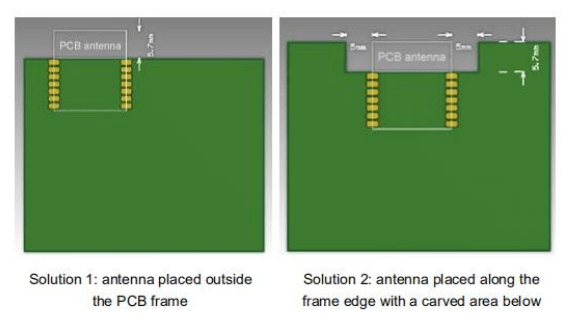
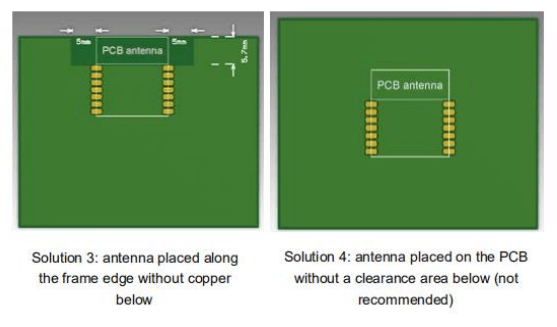
8. Firmware of DSM-054 Bluetooth Low Energy BLE Module Generic
A). API
Support customized various product solutions. and provide related API documents and support.
Customers can pair the device to the gateway (Dusun gateway or Private gateway )according
to the API description and standard protocol.
API content includes reading sensor data, controlling device switches, changing device
configuration, OTA, etc.
B). MQTT
It can provide the terminal device customization + Dusun gateway overall solution, and
can provide the MQTT protocol for the gateway to connect to the customer platform. Customers
can easily deploy the entire system and view the status and data of the terminal equipment
at any time.
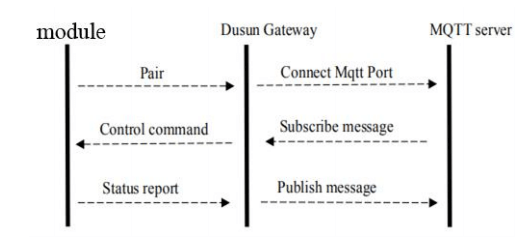
9. Instructions of DSM-054 Module BLE
Use an SMT placement machine to mount components to the stamp hole module that Dusun produces
within 24 hours after the module is unpacked and the firmware is burned. If not, vacuum pack
the module again. Bake the module before mounting components to the module.
- SMT placement equipment:
Reflow soldering machine
Automated optical inspection (AOI) equipment
Nozzle with a 6 mm to 8 mm diameter - Baking equipment:
Cabinet oven
Anti-static heat-resistant trays
Anti-static heat-resistant gloves - Storage conditions for a delivered module are as follows:
The moisture-proof bag is placed in an environment where the temperature is below 30°C
and the relative humidity is lower than 70%.
The shelf life of a dry-packaged product is six months from the date when the product
is packaged and sealed.
The package contains a humidity indicator card (HIC).

- Bake a module based on HIC status as follows when you unpack the module package:
If the 30%, 40%, and 50% circles are blue, bake the module for 2 consecutive hours.
If the 30% circle is pink, bake the module for 4 consecutive hours.
If the 30% and 40% circles are pink, bake the module for 6 consecutive hours.
If the 30%, 40%, and 50% circles are pink, bake the module for 12 consecutive hours. - Baking settings:
Baking temperature: 125±5℃
Alarm temperature: 130℃
SMT placement ready temperature after natural cooling:<36℃
Number of drying times: 1
Rebaking condition: The module is not soldered within 12 hours after baking. - Do not use SMT to process modules that have been unpacked for more than 3 months, because
electroless nickel/immersion gold (ENIG) is used for PCBs and they are seriously
oxidized for over 3 months. SMT is very likely to cause pseudo and missing soldering.
Dusun is not liable for such problems and consequences. - Before using SMT, take electrostatic discharge (ESD) protective measures.
- To reduce the reflow defect rate, draw 10% of the products for visual inspection and
AOI before the first mounting, to determine the rationality of oven temperature control
and component attachment and placement manners. Draw 5 to 10 modules from subsequent
batches each hour for visual inspection and AOI.
10. Recommended Oven Temperature Curve and Temperature
For oven temperature setting, refer to oven temperatures for wave soldering. The peak
temperature is 260°C±5°C. The wave soldering temperature curve is shown below:
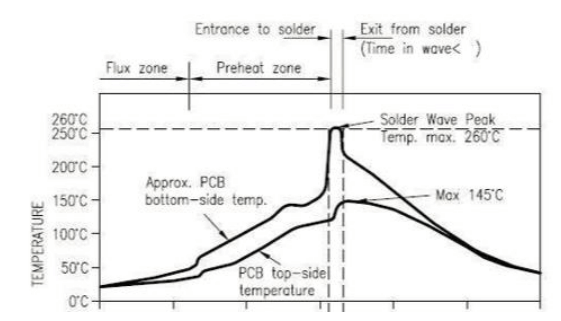
Recommended soldering temperature:
| Recommended wave soldering oven temperature |
Recommended manual soldering temperature |
||
|---|---|---|---|
| Preheat temperature | 80 to 130 °C | Soldering temperature | 360±20°C |
| Preheat time | 75 to 100s | Soldering time | <3s/point |
| Peak contact time | 3 to 5s | NA | NA |
| Temperature of tin cylinder | 260±5°C | NA | NA |
| Ramp-up slope | ≤2°C/s | NA | NA |
| Ramp-down slope | ≤6°C/s | NA | NA |
11. Storage Conditions of DSM-054 Bluetooth Low Energy Module
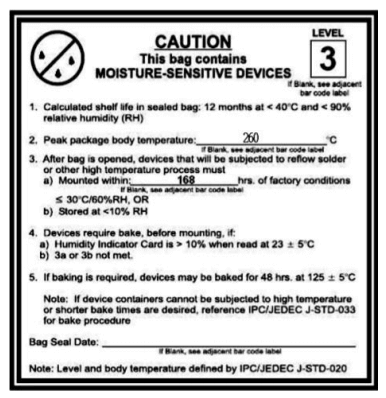
| Product No. | MOQ (pcs) | Shipping packaging method | Number of modules per reel (pcs) |
Number of reels per carton (reel) |
|---|---|---|---|---|
| DSM-054 | 3600 | Tape reel | 900 | 4 |

